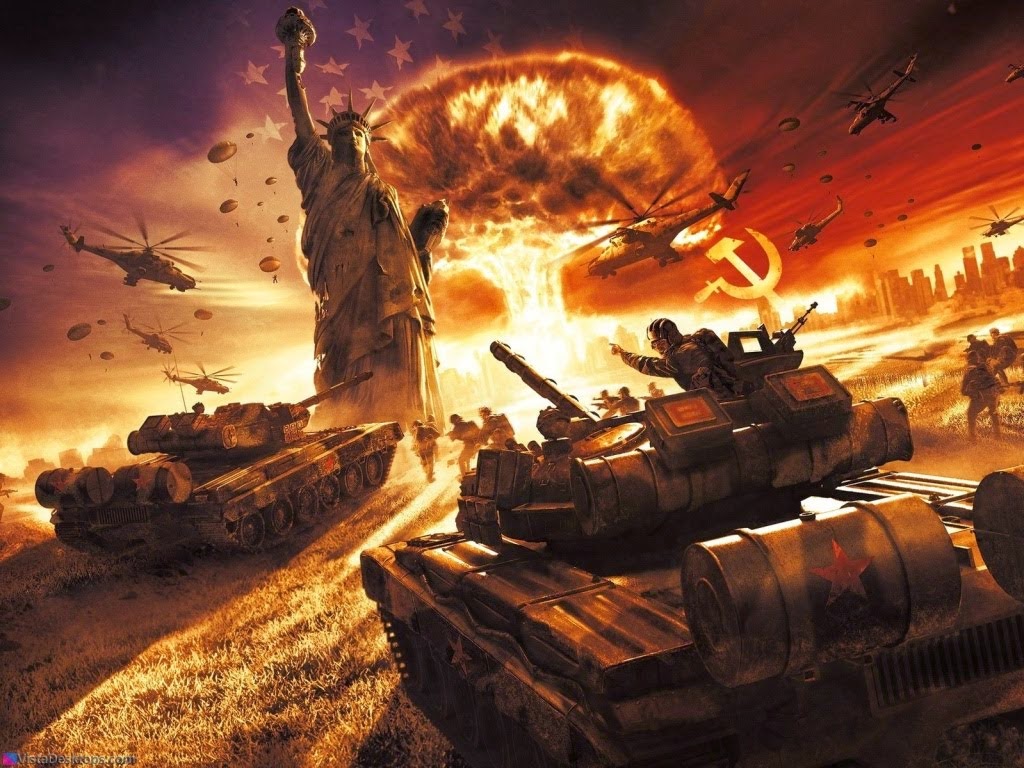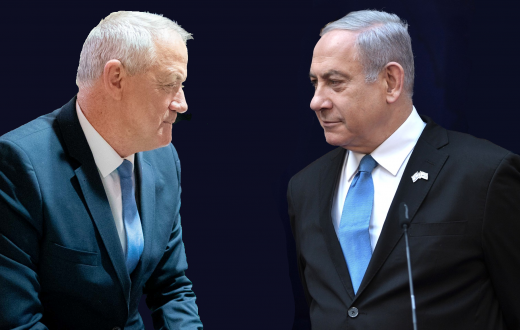They called the First World War simply ‘The Great War’ until the start of the second truly global conflict erupted in 1939. Fortunately, despite a few proxy wars and more than a few close calls during the Cold War, the world has managed to avoid a third and potentially nuclear war up until now. Nevertheless, there are plenty of observers who feel that it is only a matter of time until we all end up taking sides against one another once again, positing a range of scenarios which could lead to the outbreak of World War III. These are just a few hypothetical situations that could lead to a massive global war.
1. Russia Overextends
Almost certainly the most topical potential scenario as I write this in June 2014, worries about a renewed Cold War between East and West are nothing new. Russia in the 21st Century has routinely stood against Europe, America and their allies on the world stage, and sought to proactively assert its authority in its own backyard. Concerted efforts to reclaim disputed former Soviet territories are nothing new under Putin; before Russia’s recent annexation of the Crimean peninsula in Ukraine, there was a full-blown war with Georgia – Stalin’s birthplace – over the region of South Ossetia. However, while Russian relations with the West are currently frosty at best, it would take an act of unprecedented military bravado on Russia’s behalf to cause a full-blown shooting war.
2. Middle East Escalation
The Middle East has been a volatile region for decades, with many of the tensions in the area the result of the creation of the state of Israel. The envisioned two-state solution to the Israel-Palestine problem seems as far away as ever, and one event in Gaza or the West Bank could theoretically start a chain reaction which leads to escalation of hostilities and the eventual taking sides of countries further afield. Meanwhile, conflicts and unrest in other countries in the region continues apace, no less so than in Syria where civil war continues to tear the country apart and Bashar al-Assad is using chemical weapons against his own people. International intervention in Syria has already been hamstrung by Russian opposition and public unease after the wars in Afghanistan and Iraq; in the not-so-near future, two or more of the great world powers could yet come to blows over the issue of taking sides in an internal Middle East conflict.
3. Rogue Nukes
One of America’s primary foreign policy goals in the 21st Century has been the prevention of the development of nuclear weapons by so-called ‘rogue states’ which are perceived as hostile to the US and its allies. Iran and North Korea are the two nations that most people will equate with seeking nuclear weapons, although it is primarily the latter that is of concern to military and intelligence officials (a 2011 CIA report indicated that while Iran possessed the research necessary to develop nuclear weapons, but that the country was not actively attempting to do so). North Korea has become increasingly belligerent since the coming to power of Kim Jong-Un, and while much of the regime’s comments and actions have been bluster, the possibility of a North Korean nuclear attack on South Korea, Japan or US soil cannot be completely dismissed. If Kim were to launch a nuclear attack, the reaction of the West and the international community as a whole would have to be carefully considered – an under- or overreaction could precipitate the world’s great powers taking opposite sides in a very hot conflict. This specific example brings us to a broader potential scenario:
4. The Domino Effect
The First World War was fought primarily between the Germany (and their allies) and a UK/France/Russian alliance (to simplify things greatly); however, the single event which precipitated a cascade of declarations of war in Europe took place in Bosnia. The assassination of Austria-Hungary’s Archduke Franz Ferdinand by Bosnian Serb Gavrilo Princip led to the invasion of Serbia by Austro-Hungarian forces, yet neither of these two nations are remembered as the main belligerents of the war. While it may have taken place 100 years ago, this still proves that one small event can have far-reaching and long-lasting consequences. One example of a potential modern-day event which could lead to a domino effect would be a successful terrorist nuclear attack; this could potentially be linked (in fact or in theory) to a particular nation, causing the victims of that attack to declare war on those they feel supported the terrorists responsible. Allied and other nations could then take sides, just as they did when Austria-Hungary invaded Serbia in 1914.
5. Water Shortage
One of the biggest challenges facing the global community in the 21st Century is the issue of overpopulation and the serious potential for shortages of essential resources. Many historians believe that human conflict is essentially always a dispute over resources, be it land, food, energy supply or water, and it is becoming increasingly likely that more and more wars will be fought over access to agricultural land, fossil fuels and water sources in the future. While efforts are already underway in many countries to reduce dependence on fossil fuels for our energy needs, one universal constant will always be the need for access to water. Today, 40% of the world’s population live in areas with chronic water shortages and the global demand for this resource is increasing by 2.3% each year according to the World Bank. While it is the Middle East and Africa that currently suffer most from such scarcity, a combination of overpopulation, increased demand, and river and ocean pollution mean that getting access to clean water might only become more difficult in future, with the potential to trigger local and global conflicts.
6. Religious Wars
Some of the most bloody and prolonged conflicts in human history have been fought between those who hold opposing belief systems, and the aforementioned Middle East situation is just one example of religious war in the modern era. Predominantly Hindu India and Muslim Pakistan have fought no fewer than four wars in the almost seventy years since they gained independence from Britain; with tensions remaining high between the two countries and the region of Jammu & Kashmir in the subcontinent still disputed, there is every chance that the two could come to blows again before long. The fact that both nations are full members of the nuclear club adds extra tension to any potential future war in south Asia, and the growing reach and influence of Islamic extremists in Pakistan causes the global community to worry about the consequences should the country’s government be toppled.
7. The Dragon Wakes
For an autocratic country with over 1.3 billion people which controls a huge portion of the global economy and is one of the US and Europe’s major creditors, the activities of China seem to slip by with greater ease than one might think. Since abandoning thousands of years of tradition by getting rid of its monarchy, turning communist following a civil war and eventually embracing certain capitalist principles, the growth of this Asian giant has continued apace, and is forecast to overtake the US to become the world’s largest economy by 2016. China’s economic, geographical and numerical strength all contributes to their political ambition, with the country actively seeking to expand its sphere of influence as far as Africa and South America. What makes for potential future conflict between China and the rest of the world is its attitudes towards its own backyard, with certain regions and nations being potential future flashpoints should the Chinese government decide to exert its influence. If China were to attack a US ally such as Taiwan, Japan or South Korea, a proxy war could easily break out and lead to a full-scale world war.














